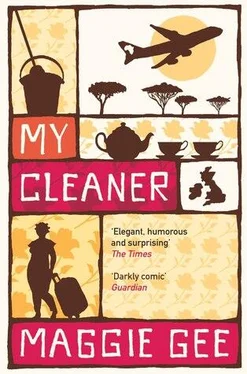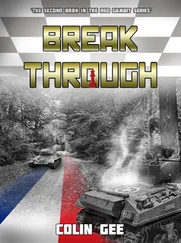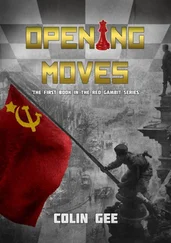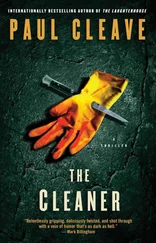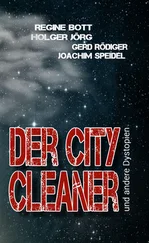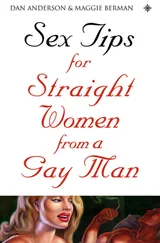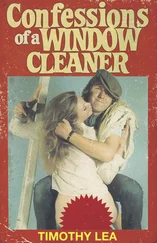“But the state needs modern young women like you. Our new president wants to encourage women. My job is to encourage young women. If you are a good girl, your aunt can help you.”
Her house was on Kololo Hill, near all the embassies, where everyone is rich. She had a pretty garden full of bougainvillaea, in three colours, white, peach and pink. Dry, papery bougainvillaea. The pink was a killing, brilliant pink, the colour of a muzungu’s lipstick. She wanted me to cut it back so the timid white and peach could flourish. She told me that her shamba boy was ill, but I knew she just wanted to see me humbled. I worked all day in the blazing heat, and in the evening she called me in and told me to wash, then the house-girl brought supper.
She said there was a new presidential scholarship that paid for women graduates to study abroad. Probably it would mean a future in the government. Certainly it meant at least a year in UK, and the chance to gain an MA from London. She wanted me to apply for it.
“But Aunty, I am not the best student in my year.” The goat was tough, but I made myself eat it. Her big white teeth cut through it like scissors. She shouted at the girl who served it, but at me she smiled, a wide blank smile.
“You are my niece. You will win the scholarship. I wish I had daughters, but God did not wish it.”
Four months later I was on a plane to London, flying through the sky for the first time, thinking about what my father had said. He had come to Kampala to see me off. I think he had never been there before. At any rate, he got lost for a day and was found by some people from our village who were selling clothes in Owino market. My mother couldn’t come: she was supervising the harvest. She sent me, wrapped in a banana leaf, a package of fried ants, delicious enswa , although the leaf was bruised and torn. Perhaps she thought I would take it to England. It would not have made the right impression!
My father was very proud of me. “At last, someone from our family is flying.”
I didn’t say, “But we often flew, we children playing round the mango tree. We used to raise our wings and fly like hummingbirds.” I didn’t want to think about the mango tree or the cousins I was leaving behind. I sat on the plastic seat beside him and told him I would buy them presents.
“They say London is very expensive,” he told me gravely. “Daughter, you will have to be wise.”
Suddenly he looked smaller and older. I didn’t say what was in my mind, that he had never been to London, that he would no longer be able to advise me. “You know your daughter can live on nothing.”
He tried to think of a last piece of advice. I think he was recalling my childhood. I used to run faster than the boys, and came into the house with my knees bloodied where I had fallen on stones or acacia thorns. The scars were still there under the nylon tights I was wearing to look European.
“Don’t run around on the plane, daughter. They say they fasten you down with a belt. If you wriggle too much you will rock the plane.”
I left him sitting there, not moving. Alone, as if he was learning something. How hard he had tried to be a good father. He had made himself say nothing about children, or marriage, although I had already left it too late according to the customs of our village.
I was young, and proud. I was going to England. The plane took off, and I looked down on Uganda. The buildings shrank as the view increased. Where was my father in so much space?
I remembered his words as the roaring plane broke through into the sunlight above the clouds. The journey levelled and became easy and the stewardess said we could unfasten our seatbelts. She had a smart uniform and shiny lipstick and her hair was flat-straight like a European. She obviously knew about flying, and London. I smiled at her and undid my seatbelt so I could lean over and look at the sun, and there was heaven. I was rushing towards it. Africa was lost beneath brilliant whiteness.
I imagined my family, small as insects.
When we landed in London they sprayed the plane against mosquitoes. My throat grew tight. As I came out on to the high steel steps, the light was like ice. I stared out at London, and nearly fell forward.
But this time I’m a woman, and everything is different.
I look at myself, tiny, all those years ago. One day I mean to write that girl’s story. I hear her voice in my head at nights. All her mistakes have become my wisdom.
Now I do not need to beg money from the government, or work like a dog in my fat aunt’s garden. Now I am too sensible to fall down the steps. Now I have flown on countless planes. Now I am too old to become a cleaner.
The letter starts to tingle in my left hand. How much would Henman pay me to go to England?
Vanessa Henman
When she rang today I nearly said, “Not now!” She sounded like all the other opportunists who ring up and bother you when you can least bear it: foreign, and flat, without affect. She said, “Is it you?” as if she didn’t like me, but of course, it is just that she isn’t English, shyness rather than anything else. Her voice had got deeper, as well, with the years. I was slamming the phone down — because let’s be frank, these firms do mostly use foreigners, so a foreign voice does make me suspicious — when I suddenly realised it was Mary.
“Mary! Is it really you?”
“Yes, Miss Henman, I got your letter.”
(Of course Mary always pronounced ‘Mrs’ as ‘Miss’. It was one of the irritants I’d almost forgotten. I’m sure I had told her that I was a ‘Dr’, but she’d looked at me blankly, in that African way. Perhaps it was because I was a single mother. I resolved that this time she should call me ‘Vanessa’. Mary and I had to make a clean start.)
Yes, she was well. She had a very nice job.
I started to tell her about Justin, his terrible depression, his refusal to eat, the way he was getting less and less mobile, the succession of doctors who could do nothing. “Justin hates everybody, Mary. Except you. Of course you know how much I love him.”
There was a silence on the line. I thought for a moment we were cut off.
“Miss Henman, I need money for Jamil. He has a place at Al-Fateh University. His father says he will be a vet, but he has to pay to get into al-Fateh.”
Jamil was the son; I had forgotten about him. Of course, the father was Libyan. Naturally there would be deals to be done. In any case, this was the African way. When they dealt with white people, they bargained upwards, just as they beat people down in the markets. I understood things better now I’d been to Africa. “Mary, I know we can work something out.”
“Miss Henman, now I shall give you my number. It is the number of my mobile. When you decide about the money, you telephone again.”
This was a new Mary. More confident…bossier. More avid for money, which took me aback. Unwilling to trust an old friend. But I’d been to Africa, I understood, for in Africa, everyone is poor, poor things, even the richer ones aren’t quite like us, so I made allowances, and rang off, gratefully, and did some calculations on an envelope.
She doubled what I offered, and I agreed.
Of course money is problematic, with Africans. They don’t understand that we borrow everything, that we are poor in a different way. That my house cost me more than she could earn in a lifetime. They never understand we have money troubles too. That life in London is hideously expensive. I suppose it is a failure of imagination.
Although, to be fair, they themselves have nothing. The monthly wage of a house-girl in Kampala is not much more than five English pounds.
Читать дальше
